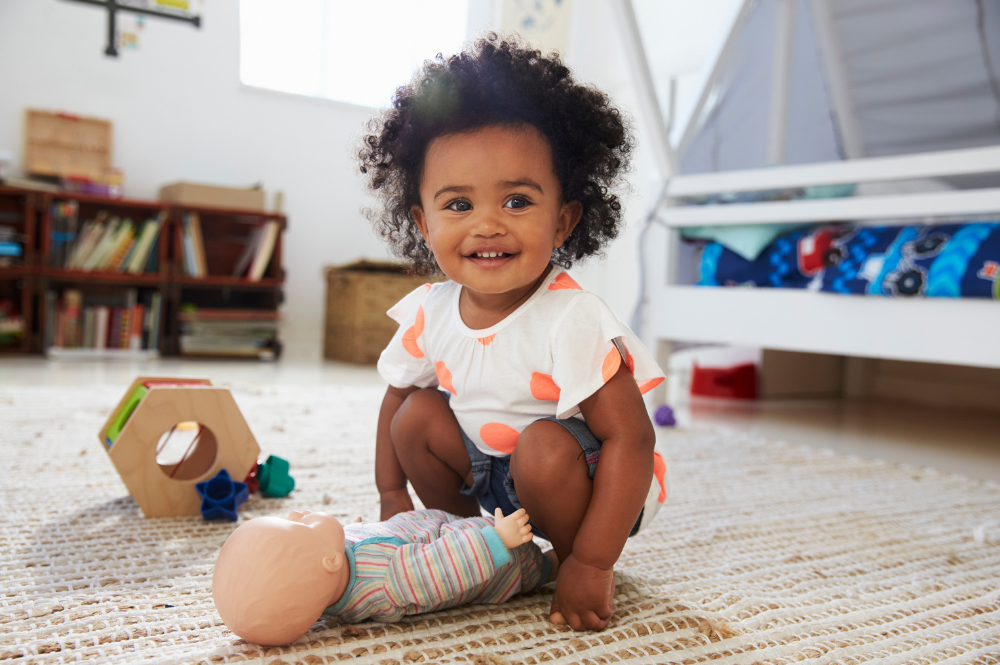Do you have a baby or toddler who is only happy while you are actively playing with her? When you leave the room, does she cry as if you’ve left the country? This post will cover why it’s important for your baby to have some independent play, and give you a few ideas to help your baby learn how to enjoy her independent playtime, which will provide you with a much-needed break, as well.
Independent Play is Important for Development
You can’t blame your baby for wanting to play with you all day long. You are one of his favorite people, and you should feel honored to hold that spot. However, it is not healthy for either one of you if he cannot play by himself for short periods of time. Independent play is wonderful for your baby’s development. It improves creativity, confidence, patience, attention span, and much more. The additional upside is that you get to check off a few items on your to-do list while your baby occupies himself and works on his growth and development.
You don’t need to feel guilty about wanting to encourage independent play for yourself and your baby. As long as you maintain a solid connection between you, and a good balance between solitary and “together” playtime, independent play is a good thing!
Taking Steps towards Independent Play
Independent play is a learned skill that you can teach your baby. It won’t be accomplished overnight, and there are many steps to help your baby gradually discover how wonderful her own imagination and independence can be.
Here are a few important ways to encourage independent play.
- Don’t sneak away from your baby while he is distracted. Once he realizes that you’re gone, he may panic. This leads to him always worrying that you might disappear at any time, which makes him even clingier. The best tactic is to give your baby a calm, quick explanation. Just casually say, “I’m taking this basket to the laundry room,” or, “I’m going to get my glasses.” It can also be helpful if you sing, talk, or hum as you go so that he can still hear your voice even when he can’t see you.
- Make peek-a-boo a regular game in your house. It is important for you baby to learn that you are still there even if she can’t see you. Hide and seek is good, too, since it’s also important for her to learn that even if you walk away, you will come back.
- You can make a daily routine that includes short bursts of independent play for your baby. Set up regular activities at certain times where you get in the habit of accomplishing small tasks in eyesight of your baby, and he will get used to playing on his own during those brief times.
- Begin by engaging with your baby on the floor with her favorite toy. Once you see that she is immersed in solo play, you can move a few feet away. Simply sit there and watch her. You can say a few positive words if she looks to you, but try to keep a bit of distance. Over time, you will gradually move farther and farther away to the point where you can even be in an adjacent room – cleaning, cooking, or handling paperwork.
You may also like: Sleep Setbacks: What You Need to Know or Parent Coaching: Support When You Need It
- If your baby initiates independent play on his own, take advantage of it! This often seems to happen when you least expect it. You don’t want to miss chances to allow him to find the joy in his own activities. Try not to disturb him if he is immersed in an activity because even your presence could break the spell and cause your child to lose their focus.
- Independent play needs to have a healthy balance of mommy/baby playtime. Set aside special playtimes where you give your child your undivided attention. You can set a timer and explain that when the timer goes off in 10 minutes, you will need to go make dinner. Your little one will appreciate the focused playtime and understanding what is happening and what to expect.
- A thoroughly childproofed home allows your child to explore to his heart’s content. If you are always pulling him away from dangerous or delicate items, he will likely increase his clingy behavior. Childproofing allows you (and your kiddo!) to feel calmer and allows you to take your eyes off of him for a minute or two. Give your baby the freedom to explore happily and independently. You can always bring out the fragile decor once they grow up a bit.
- Forcing independence is rarely effective and can make your baby clingier. If you are pushing your child away when she is clinging to you, she will have increased feelings of helplessness and frustration. Instead, give her extra cuddles and engage with her in a fun activity or with a fun toy. You can naturally pry yourself away from the activity once your baby is enjoying herself.
This post was originally shared on the author’s blog.
